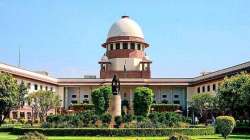Decision to notify minorities will be taken after discussion with states, stakeholders: Centre tells SC
The apex court had earlier granted four weeks to the Centre to respond to a plea, which has sought directions for framing of guidelines for the identification of minorities at the state level, contending that Hindus are in minority in 10 states.

The Centre informed the Supreme Court Monday that the power to notify minorities is vested with the Union government and any decision in this regard will be taken after discussion with states and other stakeholders.
The apex court had earlier granted four weeks to the Centre to respond to a plea, which has sought directions for framing of guidelines for the identification of minorities at the state level, contending that Hindus are in minority in 10 states.
In an affidavit filed in response to a plea filed by advocate Ashwini Kumar Upadhyay, the ministry of minority affairs said the central government has notified six communities as minority communities under section 2C of the National Commission for Minorities Act, 1992.
“It is submitted that the question involved in the writ petition has far-reaching ramifications throughout the country and therefore any stand taken without detailed deliberations with the stakeholders may result in an unintended complication for the country."
“Though the power is vested with the central government to notify minorities, the stand to be formulated by the central government with regard to issues raised in this group of petitions will be finalised after having a wide consultation with the state governments and other stakeholders."
The ministry said this will ensure that the central government is able to place a considered view before the apex court taking into consideration several social, logical, and other aspects obviating any unintended complications in the future concerning such a vital issue.
The top court has posted the matter for hearing on May 10 and asked the Union of India to place its stand on record on a plea filed by advocate Ashwini Kumar Upadhyay.
The Ministry of Minority Affairs had earlier told the apex court that state governments can declare any religious or linguistic community, including Hindus, a minority within the said state.
The ministry had also submitted that matters concerning whether followers of Hinduism, Judaism, and Bahaism can establish and administer educational institutions of their choice in the said states and those related to their identification as a minority within the state may be considered at the state level.
Upadhyay had challenged the validity of section 2(f) of the National Commission for Minority Education Institution Act, 2004, alleging that it gives unbridled power to the Centre and termed it "manifestly arbitrary, irrational, and offending".
Section 2(f) of the Act empowers the Centre to identify and notify minority communities in India.
The plea, filed through advocate Ashwani Kumar Dubey, said that denial of benefits to the "real" minorities and "arbitrary and unreasonable" disbursements under schemes meant for them to the absolute majority infringe upon their fundamental right.
"In the alternative, direct and declare that followers of Judaism, Bahaism, and Hinduism, who are minorities in Ladakh, Mizoram, Lakshadweep, Kashmir, Nagaland, Meghalaya, Arunachal Pradesh, Punjab, and Manipur, can establish and administer educational institutions of their choice in the spirit of the TMA Pai Ruling," the plea said.
The apex court in the TMA Pai Foundation case had held that the state is well within its rights to introduce a regulatory regime in the national interest to provide minority educational institutions with well-qualified teachers for them to achieve excellence in education.
Quoting Article 30 of the Constitution, the plea said that minorities whether based on religion or language shall have the right to establish-administer educational institutions of their choice.
The petition said that denial of minority rights to actual religious and linguistic minorities is a violation of the rights of minorities enshrined under Articles 14 and 21 (no person shall be deprived of his life or personal liberty except according to procedure established by law) of the Constitution.
The apex court had earlier allowed a plea seeking transfer of cases from several high courts to it against the Centre's notification to declare five communities -- Muslims, Christians, Sikhs, Buddhists, and Parsis -- as minorities and tagged the matter with the main petition.
ALSO READ | 'Unwarranted communal colour' given to Jahangirpuri demolition drive: NDMC tells SC
ALSO READ | 'Self-criticism shouldn't erode self-confidence, morale': Sonia Gandhi at CWC meet